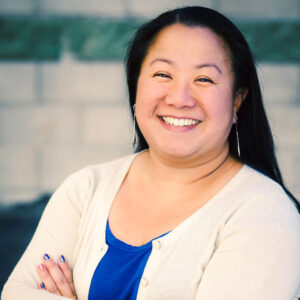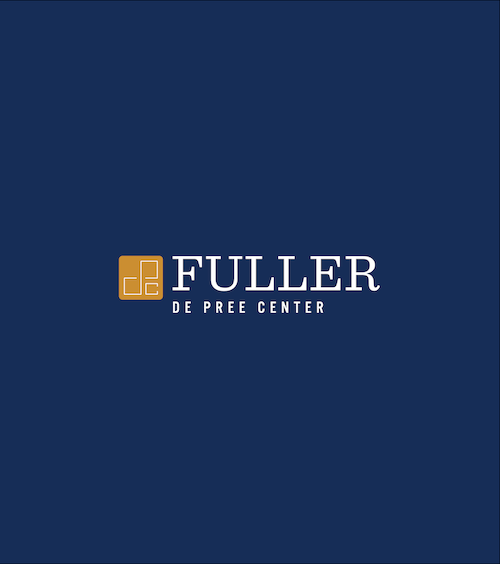Women at Work: a Round Table Conversation

Michaela O’Donnell Long, Lead Strategist, De Pree Center
Michaela: What I would love to try to have here are the conversations that I feel like I’m having naturally with people everywhere right now.
I feel like the most important work that I’m doing right now is not work I’m getting paid to do. The tricky part is that I can’t, nor do I really want to, just quit my job and go do advocacy work full time. I’m like, “Okay, in order so there’s not a disconnect between how I’m spending my work day and all this stuff that’s boiling in our country and in my heart, I want to know: how do I push the needle in my own creating?”
A lot of what I do is produce and oversee the creation of content. So, how do we create content in the midst of the season that we’re in? I’m wondering what you all think?
Meggie: My theology brain kicks on when we talk about that. Through that theological lens, what I hear in your question is, “What does it mean to be prophetic in our daily actions?”
Michaela: Yeah, that’s good.
Meggie: Notice the disconnect between what God has called us to be in community and where we currently are. I actually think that the prophetic voice usually takes on a creative form because you have to approach a work problem or these bigger societal problems from a creative lens in order to find the change that’s not currently available.
Michaela: Yeah, creativity can cut through the noise. Art cuts through noise. I like that framing of the prophetic, actually. That’s really helpful for me.
Actually Meggie and I were talking the other day and Meggie was framing her January as slumpy. I was like, “Yeah, I feel so slumpy right now with everything’s that’s going on.” I asked my husband, “Dan, do you feel slumpy?” He’s said, “I don’t, actually.” He said, “I feel more resolved than ever to be the best creator I can be, to get the highest position that I can possibly get to and to be able to affect as many positive people for change.” So embodying these positive, really practical practices in the face of chaos is actually a form of resistance.
Wenonie: Like you were saying about the prophetic, you want to be prophesying that hope—a future that is going to look better than we are feeling right now.
Meggie: What you were just saying, Michaela, reminds me of your second question, “What practices shape our daily work?” Especially when you’re talking about being creative and then middle of these kinds divisions that are happening in our society. And Dan’s response to that question, “Are you feeling slumpy?” is a slightly more grandiose approach than a lot of us can take. So what are some smaller postures or practices that we can have on a daily basis?
Sarah: If you follow my work Instagram, you’ll see that I am the biggest proponent of rest. I talk about it all the time. It’s my best business partner. The way that I’ve integrated that into my daily rituals is that I never set my alarm.
Michaela: Oh, my God, I’m so jealous.
Wenonie: If only I could do that.

Sarah Magidoff, Owner of Canopy Creative and the artist behind our graphic design
Sarah: I wake up when my body naturally asks me to wake up. I first made a decision to start doing that based on a time when I was trying to get up as early as possible because mornings are my most creative part of my day. Then I noticed after a couple of weeks I would hit 11:30 a.m. and just be dog-tired. I would think to myself, what is going on? I can’t even create for the rest of the day. Then the next day I accidentally slept in. I was like, “Oh, my gosh, I’m three hours past my alarm; think of all the work that I could have gotten done in that time.”
As soon as I started work, in the next 60 or 90 minutes, I accomplished more than I expected to accomplish. I got through my entire to-do list in 90 minutes after waking up fresh, when my body asked me to wake up. That set a bell off in my head. I was like, “Well, what other ways can I be incorporating rest into my day?” So now, I put in a good solid two hours of work in the morning. I get a ton of stuff done, because like I said, that’s my most creative part of my day. I take two hours of rest for lunch and to go for a long run. Then I come back around 2 or 3 p.m. and I finish the rest of my day within the next couple of hours. In total I spend on average, four hours a day working.
Michaela: That’s so crazy.
Sarah: I have been more productive incorporating all that rest as a daily and weekly rhythm than I would if I just hit the ground running, 7 a.m. and worked till 6 p.m. every day. I actually get more done when I incorporate more rest than when I just am working all the time.
Michaela: Okay, can I ask you a question about that?
Sarah: Yep, go for it.
Michaela: This is the most interesting thing I’ve heard in a long time. Are you saying that you actually get more done in a work week with this model than you would if you had just given yourself 40 hours to complete things? You actually accomplish more this way?
Sarah: Absolutely.
Michaela: You’re not choosing to scale back or make less money?
Sarah: No.
Michaela: You’re like, “The rest is critical to the productivity.”
Sarah: Totally. I hit a point in my day where I get really foggy brain and something that should take 15 minutes can easily take me an hour and a half, like triple or quadruple the amount of time that it should take.
Meggie: On that note—Sarah, would you like to ask your first question?

Sarah: I actually think this is a really great transition from what we were just talking about because the origin of this question for me has to do with me finding my natural working rhythm. I used to be in a 9 to 5 office which technically was 7 a.m. to who knows when? Bring your blanket, you might be sleeping here.
With that in mind I ask this question: as you have worked toward your goals, have there been any major roadblocks or setbacks that have prevented you from getting to where you want to go? Were you able to use these roadblocks to create paths that led to results that were even better than you imagined, and in what ways, if any, were these roadblocks distinctive for you as a woman navigating her work?
Meggie: As I’m thinking about your question, I wonder if we could replace “roadblocks” with a “crucible experience.” Maybe a roadblock is not just a dead end but actually is this critically-forming moment.

Wenonie Ling, Office Coordinator, De Pree Center
Wenonie: In my previous job, finally I had gotten to the point where I felt like, “Okay, this is what God made me to do.” I was an assistant to a children’s pastor and a student pastor which was great, but I think that some churches get too stuck on the roles that they think each staff member should have and they don’t allow for the spirit to move in the way their congregation’s moving in the ministry settings.
It came to a time where my supervisor basically said that I was supposed to spend 40 hours a week behind a desk and you can’t do ministry behind a desk, you have to be building relationships with people. That was a big change where I was like, “Okay, God, I finally got to a place where I felt like this is what I was made to do, and I’m loving it but you’re going to take it away. What do I do now?” The good thing about that is that I’ve learned that I can just trust Him. I think that trust has come out of facing some of those roadblocks that were unexpected. It felt like, “Here’s the tease, but maybe that’s not necessarily what you’re supposed to do in this next season of life.”
Michaela: It’s a really articulate way to say that: “Here’s the tease.” Sometimes there’s work that I’ve really wanted to do and I feel like, I’m supposed to do these things if I feel like God’s asking me to do them, but they’re not quite happening. I feel like I’m trying and I’m pushing on doors, and it feels like a tease. You’re like, “God, what do I do with that?”
Sarah: What does that mean when you are called to leave something that you feel like your flourishing in or that you really have a passion for? How do you find your passion, and the next thing that you’re unsure of whether or not you’re going to flourish in, right?
Sarah: Ultimately, we want to get to a place where we can flourish in our faith and our work, right?
Meggie: Maybe the Spirit is nudging us in our dissatisfaction in a way that is actually healthy. Maybe that’s what keeps us creatively finding new opportunities or continuing to seek God. I’m thinking about the times that I’ve felt this little voice of dissatisfaction that has actually pushed me to think about what is right for me, what is healthy, or what is a good rhythm for me. Listening to that dissatisfied voice to me actually feels faithful.
Michaela: It’s like these important pivots come when I’m feeling dissatisfied for whatever reason. That’s a good word, dissatisfied.
Sarah: It brings about self-evaluation, you know, which goes with what you were saying about learning about yourself and knowing how you are going to be able to set yourself up to hopefully get to that flourishing point.
Meggie: My question is pretty basic. It’s about stories. What stories have influenced the way you understand faithful work? Is could be a story from your personal life, from your family life, Biblical stories, or sometimes my favorite—these legacy stories that are passed on in community or family.
Wenonie: I think the story that sticks with me the most is probably the immigrant story because my parents are immigrants. Most immigrants usually come to the U.S. because it’s the American Dream, right? I’m Chinese and I think within the Chinese immigrant story, you have to work really hard in order to provide for your family because you want to provide your children with better opportunities than you had when you were growing up.” Culturally, it’s always made me aware that I need to work hard.
It just broke my heart that these kids would be in a daycare system until 6 or 7 because their parents wanted to be able to work to provide for them but forgetting that it was more important for them to spend time with them. I think that that’s something that’s always been really hard, because as just a regular person you want to work hard and you want to do well but what’s the ending? As a person of faith I think I came to the realization was that it wasn’t just about working hard but it was about bringing excellence to glorify God with. I think that’s probably how I’ve brought in my family’s cultural experience with work and then with my faith.
Sarah: I’ve actually had quite a struggle with the idea of work. I’d say only within the past 18 months have I actually really thrived and have been excited to go to work. It’s a conversation that I’ve internally dove into.
I have been pressing into the questions like, “Why do I hate work so much?” To me it felt like a burden. Then I heard work explained by my pastor during one sermon. He was dissecting the story of the Adam when he was tasked with the activity of naming all the animals. He brought that passage of Scripture really to life for me, transforming work into something that God actually intended as a method to breathe life into our souls. That we need activity every single day and we need activity that gives us purpose and meaning and life.
When he said that to me, the light bulb went off of like, “Oh, these things that I do, the work that I do with my hands, should bring satisfaction and life and I should take pride in them.” At that point I started reframing all of my client work as being able to partner with brands and people who have stories that they need unearthed and told, and being able to come alongside someone and see their potential and really bring that to life. It clicked for me.

Meggie Anderson, Project Manager, De Pree Center
Meggie: One of my family legacy stories is about my Grandma Warhola. My mom’s side are the Warholas and we’re always talking about those feisty Warholas. One of my favorite stories about my grandmother is that she once, when she was older, slipped and fell down a flight of stairs, and no, that’s not the funny part.
She had this huge goose egg on her forehead and she had broken her wrist, but she had dinner reservations and she didn’t want to cancel them. She went to dinner and she asked the waiter to only bring her something she could eat with one hand and she also asked for a cup of ice water to hold onto her forehead. The next day she went to the doctor and the doctor said, “Oh, yeah. Your wrist is broken, you need surgery.” She said, “I can’t have surgery right now. I have travel plans and it’s going to have to wait.” She went off somewhere extravagant and came back and had to have surgery afterwards. Her hand was kind of permanently claw-shaped…
Sarah: Oh, my God.
Meggie: Because she didn’t get the surgery right away.
So how does that story relate? I think what I love about what I inherit from these really strong women in my family is this kind of stubborn vivaciousness. They just feel unstoppable. The women in my family are unstoppable and I love that that’s a legacy I inherited from my family. It’s not always healthy. It’s not always healthy to go to Europe with a broken wrist and come back with it permanently claw-shaped, but it’s also inspiring to me.
I think of women in my family aligning with the women we see in the Bible and how that they are unstoppable and creative and vivacious in their own ways. That’s one of my favorite things that I hope to see develop in my work: how can I be unstoppable? Maybe not in such a detrimental way, but in a way that feels honoring of the women who have gone before me.
Meggie: Let’s shift gears a little bit now. I think because we have a good framing of some of the ways that we’ve been shaped to think about our work. I think I’d like to end on Wenonie’s question.
Wenonie: As we were talking about stories I was just curious on a time that any of you felt you came up against discrimination in the workplace because of your gender, because of your age, because of cultural background or even position within the company hierarchy or whatever, and how you maybe handled it or how you reframed the situation in the midst of that discrimination?
Michaela: That’s a good question.
Meggie: That’s a hard question.
Michaela: It is hard. I think for me it’s one of those ones where I think I lived blindly for a while, actually. I grew up with dad who literally was like, “You will probably be the next president of the United States.” He thinks I’m God’s gift to the world.
In some ways because I grew up shielded by a father, not from life, but because of his belief in me, it’s not been until the last five or so years that I’ve really started to parse out these nuances of discrimination in daily interactions. These nuances happen every five seconds. They happen every five seconds either by me towards somebody or by somebody towards me. I’m working on how to name those in a way that are helpful, that learning how to choose when to confront and when to put energy somewhere else, and I think that’s just hard. I don’t feel like I have that down but I do think that there is a lot of value in being able, for me, to name the subtle ways that it’s happening.
Meggie: My story for your question Wenonie actually didn’t happen in the work place but has severely affected the way I present myself in my work. I was taking a preaching class here at Fuller and so I was doing all of this public speaking. My classmates were supposed to give me constructive criticism on basically how you preach, like, “Did your sermon make sense, did you have a conclusion,” and so on. Out of all the people who gave me feedback, three out of 10 of them were basically criticizing my voice—that I have a soft, feminine-sounding voice.
My classmates were supposed to give me constructive criticism on basically how you preach, like, “Did your sermon make sense, did you have a conclusion,” and so on. Out of all the people who gave me feedback, three out of 10 of them were basically criticizing my voice—that I have a soft, feminine-sounding voice.
That was really discouraging for me because it’s nothing I can change about myself, but they were so used to public speakers sounding a certain way. Now it’s really hard to feel like I have the ability to say something important and that it will be heard and received like in a meeting, especially when I’m with a group that’s male-dominated. I actually don’t know if I have an answer to the second part of your question but that’s something that I’m continuing to work around, like how do I maybe even just posture or present myself so I trust my voice. Maybe that’ll help other people to trust it even if it doesn’t sound the way they want it to.
Wenonie: It’s about the boxes that people want to put us in as women. I think we’ve all learned to adapt but it’s just so hard. My story of discrimination was about subtle discrimination. For one of the organizations that I had worked for, one of the board members had called and we had talked about something that I didn’t necessarily agree with. After the call he ended up emailing all of the board members, listing the things that we talked about and saying that I had agreed with him, to which I was like, “So, what do you do?” Right?
Do you ignore it? Do you respond? It’s really hard to figure it out and so I just ended up replying all, and I said, “I’m sorry, I did not agree to all of that.” Then my boss called me and was like, “You made that board member lose face,” and all this other stuff. I was just like, “But is it more important that he lost face or is it more important that I’m truthful and that I don’t get roped into something that I didn’t necessarily agree to even though maybe he thought that was the way to do it,” right?
I really felt like the conflict was because of my position. I was an office worker and I was supposed to agree with him because he was a board member, and I just really wasn’t okay with that.
Meggie: That power dynamic thing.
Wenonie: Yeah, why is my voice not as important as his?
Michaela: Right, or why do some people think that way, because your voice is just as important. We get weighted all the time; our voices get weighed all the time.
Meggie: Well I just want to say thank you for doing this because I feel both challenged and encouraged by sitting with you and talking. I want to ask if anyone has any closing thoughts that you didn’t get to share before we close?
Michaela: The last thing I’ll say is that conversations like this are so critical because every time I have them I’m opened up to one new thing to pay attention to, one new type of relationship to lean into, one new type of person to listen to in a way I haven’t before. So I’m feeling really grateful right now.
Meggie: Thanks. All right, well thank you so much.
Interested in learning more about the complex realities of women in the workplace? Click here to download our new free workbook, A Seat at the Table.



